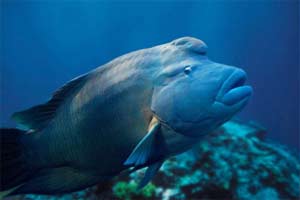Protection of endangered aquatic species
According to the Department of Environmental Protection of the Central Highlands and Southeast, at restaurants in Kon Tum province, the price of freshwater eel has suddenly increased from VND 120,000 / kg to over VND 350,000 / kg, but almost still not Earn natural eels to serve the fastidious diners!
 Humphead Wrasse , a giant fish that is endemic to coral reefs (Photo: BBC) Area of 3 communes capable of catching eels in the upstream of large streams is Ngok Tem, Xa Hieu, Mang But (district Kon Plong, Kon Tum) in recent years has been 'plowed' with destructive fishing measures such as electric pulse, or used poisonous plants mixed with lime powder, chemicals . sprayed down. places where eels live. As a result, not only this fish but also many other aquatic organisms are in danger of extinction.
Humphead Wrasse , a giant fish that is endemic to coral reefs (Photo: BBC) Area of 3 communes capable of catching eels in the upstream of large streams is Ngok Tem, Xa Hieu, Mang But (district Kon Plong, Kon Tum) in recent years has been 'plowed' with destructive fishing measures such as electric pulse, or used poisonous plants mixed with lime powder, chemicals . sprayed down. places where eels live. As a result, not only this fish but also many other aquatic organisms are in danger of extinction.
Not only Vietnam, many countries in the region are also having " headaches " because the situation of exploiting aquatic products indiscriminately to . serve diners ham of strange. Indonesian customs have recently seized a very special shipment: live electric eels (Humphead Wrasse, a giant fish endemic to coral reefs).
This fish is named in Appendix II of CITES Convention, which means that it can only be exploited and traded under strict control, but it is often traded illegally to serve Luxury restaurants in Hong Kong, Malaysia, Singapore and China . with original prices up to 100 USD / kg.
This is the third time since early this year Indonesia Customs seized these illegal shipments. Because fish is very expensive, it is almost 100% exported without consumption in Indonesia's domestic market. It is worth mentioning that due to the popularity, this fish rarely has the opportunity to live until adulthood.
Scientists say the fish can be as long as 2 meters, weigh 190 kg and live for 30 years, but are often caught and " on the plate " when they are in their ' teenage ' age because of easier consumption and because of the habit of liking 'using whole fish' of Asian diners. Hong Kong is the largest consumer market, but other Asian markets are also very attractive .
In fact, it is impossible to completely ban the consumption of products of this type, but according to international researchers, the most reasonable solution is to tighten and strictly enforce regulations to control closely exploit and buy and sell rare and precious animal and plant products. At that time, a 'mutually beneficial' relationship will be established: merchants can still buy and sell products, consumers (affordability) will still enjoy their favorite food, and rare and precious plant and animal species will continue to have opportunities to survive on the earth .
According to the latest report that TRAFFIC, an international nature conservation organization, is preparing to announce officially: the trend of wildlife trade and consumption in Vietnam is now growing stronger than ever.
This is the biggest risk for many wildlife species, pushing nearly 700 species to the brink of extinction at the national level, more than 300 species globally endangered. In the past 10 years, Vietnam's Red Book has been added to 148 species. Compared to the Red Book published in 1992, which is ' endangered' , now the Red Book of Vietnam has to use the term ' extinction '. 46 other species are considered to be 'extremely endangered ', including Indochinese tigers, sea cows, king cobra and primates.
- Proposing to supplement 37 endangered and rare species prioritized protection
- Singapore: More than 100 new aquatic species have been discovered
- 10 endangered species in 2012
- Nearly 21,000 species of plants and animals are about to become extinct
- Vietnam establishes an endangered pine species conservation area
- Build 120 houses for aquatic species in coastal areas
- Successfully breeding many freshwater fish species
- More than 16,300 species endangered
- Endangered animals
- The international community raises the level of shark protection
- The world's 10 most exotic and endangered amphibians
- IUCN: Endangered sharks!
 Is the magnetic North Pole shift dangerous to humanity?
Is the magnetic North Pole shift dangerous to humanity? Washington legalizes the recycling of human bodies into fertilizer
Washington legalizes the recycling of human bodies into fertilizer Lightning stone - the mysterious guest
Lightning stone - the mysterious guest Stunned by the mysterious sunset, strange appearance
Stunned by the mysterious sunset, strange appearance